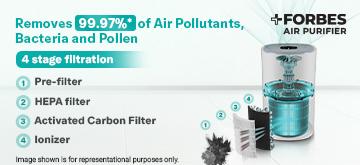
HEPA Filter vs. Regular Filter: What’s the Difference?
PUBLISHED ON: 05-Sept-2025
Breathing clean air indoors is not as simple as it sounds. Think of a family whose home faces a busy road; every time a window opens, fine dust and vehicle fumes sneak inside. Even pet-friendly homes or spaces with smokers often struggle with odours and lingering discomfort. In all these cases, the right filter can make the difference between stale, polluted air and a fresh, healthy environment.
This is where HEPA filters make a difference. By trapping microscopic particles such as dust, pollen, smoke, and pet dander, they create a safer, fresher indoor environment. Whether it’s reducing sneezing fits, easing breathing for asthma patients, or simply eliminating lingering smells, HEPA filters bring visible improvements to everyday life.
Choosing the right air purifier often comes down to understanding the filter it uses. This guide will help you decide whether your home needs a HEPA filter or a regular filter.
What is a HEPA Filter?
A HEPA filter (High-Efficiency Particulate Air) is designed to trap extremely fine particles from the air. A True H13 HEPA filter can capture up to 99.97% of airborne particles as small as 0.1 microns, including dust, allergens, odours, and even some bacteria.
The fibres in HEPA filters ensure that even microscopic pollutants don’t slip through, making them a gold standard in air purification. They are particularly recommended for homes with asthma patients, allergy sufferers, or anyone concerned about clean indoor air.1
What is a Regular Filter?
“Regular filter” typically refers to basic air filters used in appliances or entry-level air purifiers. These filters may use foam, fibreglass, mesh, or non-HEPA grade paper to trap large particles like visible dust, lint, and hair.
While they are effective at improving general air cleanliness, regular filters cannot capture microscopic pollutants such as fine dust, bacteria, or allergens. This makes them more suitable for areas where air quality isn’t severely compromised.
True H13 HEPA Filter vs. Regular Filter
Feature | True H13 HEPA Filter | Regular Filter |
Filtration Efficiency | 99.97% of particles ≥ 0.1 microns | Basic dust, lint, and larger particles |
Target Pollutants | Dust, pollen, odours, bacteria, allergens | Visible dust, hair, coarse particles |
Best For | Allergy sufferers, asthma patients, and high-pollution areas | General air cleaning in low-pollution areas |
Lifespan | 9–12 months (depends on usage) | 1–6 months (varies by type) |
Buying Guide: When to Pick HEPA vs. Regular Filter?
Choosing between a HEPA filter and a regular filter depends on your environment and health needs. If you live in a polluted city, near busy roads, or in an area with high pollen levels, a HEPA filter is the smarter choice as-
- Health Protection – Traps microscopic allergens, dust, pollen, and pollutants, helping asthma patients, allergy sufferers, and sensitive family members breathe easier.
- Better Indoor Air – Ideal for areas with high pollution, smog, or seasonal allergens.
- Long-Term Value – Though costlier, HEPA filters provide superior protection and can reduce long-term health risks.
- Convenience & Efficiency – Advanced HEPA purifiers are often quieter, more energy-efficient, and feature smart sensors, auto modes, or WiFi controls.
When to Choose: Pick a HEPA filter when clean air and health are priorities. Regular filters are suitable when your main goal is basic air cleaning on a budget.
Maintenance Tip: HEPA filters typically require replacement every 9–12 months, depending on usage and pollution levels. Always check for True HEPA certification to ensure maximum effectiveness.
Forbes Air Purifiers with HEPA Filters
To make the choice clearer, let’s look at two excellent HEPA air purifier examples-
Forbes Smart 355 Surround 360° Air Purifier
Perfect for medium-sized rooms, this purifier uses True H13 HEPA filtration along with activated carbon and plasma purification for maximum efficiency. Its 360° surround air intake ensures clean air circulation throughout the space. With smart sensors, auto mode, and WiFi-enabled controls, it brings convenience alongside health protection.
Forbes Smart 500 Surround 360° Air Purifier
Designed for larger spaces, the Forbes Smart 500 takes purification to the next level with AI-powered filtration adjustment, VOC indicators, and multi-stage filtration. It not only removes fine particles but also neutralises odours and volatile organic compounds with the help of a True HEPA filter. Ideal for living rooms or large spaces, it delivers powerful yet quiet air cleaning.
Conclusion
The choice between a HEPA filter and a regular filter comes down to your environment and needs. If you want deep protection from allergens, pollutants, and fine dust, a HEPA filter air purifier is the best option. If your goal is simply basic dust control at a lower cost, a regular filter works fine.
For households prioritising health and clean air, especially in cities where pollution is a daily concern, HEPA-based air purifiers like the Forbes Smart 355 and Forbes Smart 500 offer reliable and advanced protection.
Frequently Asked Questions
Is the HEPA filter price worth the investment?
Yes, they are worth the investment as HEPA filters capture microscopic particles that regular filters miss, making them essential for allergy relief and protection in polluted environments.
Do HEPA filters remove odours too?
With Surround 360 Air Intake Technology, HEPA filters trap particles, and for odour removal, these purifiers also include activated carbon filters.
How often should I change my air purifier filter?
HEPA filters usually last 9–12 months, while regular filters may need replacement every 1–6 months, depending on usage and air quality.
